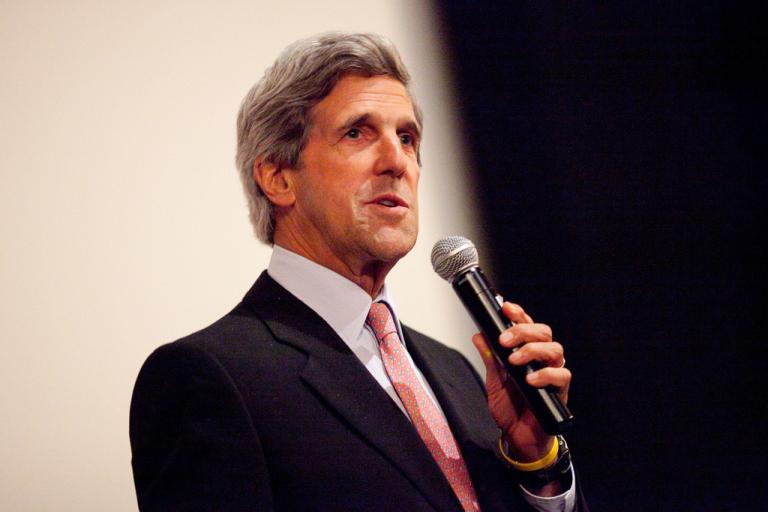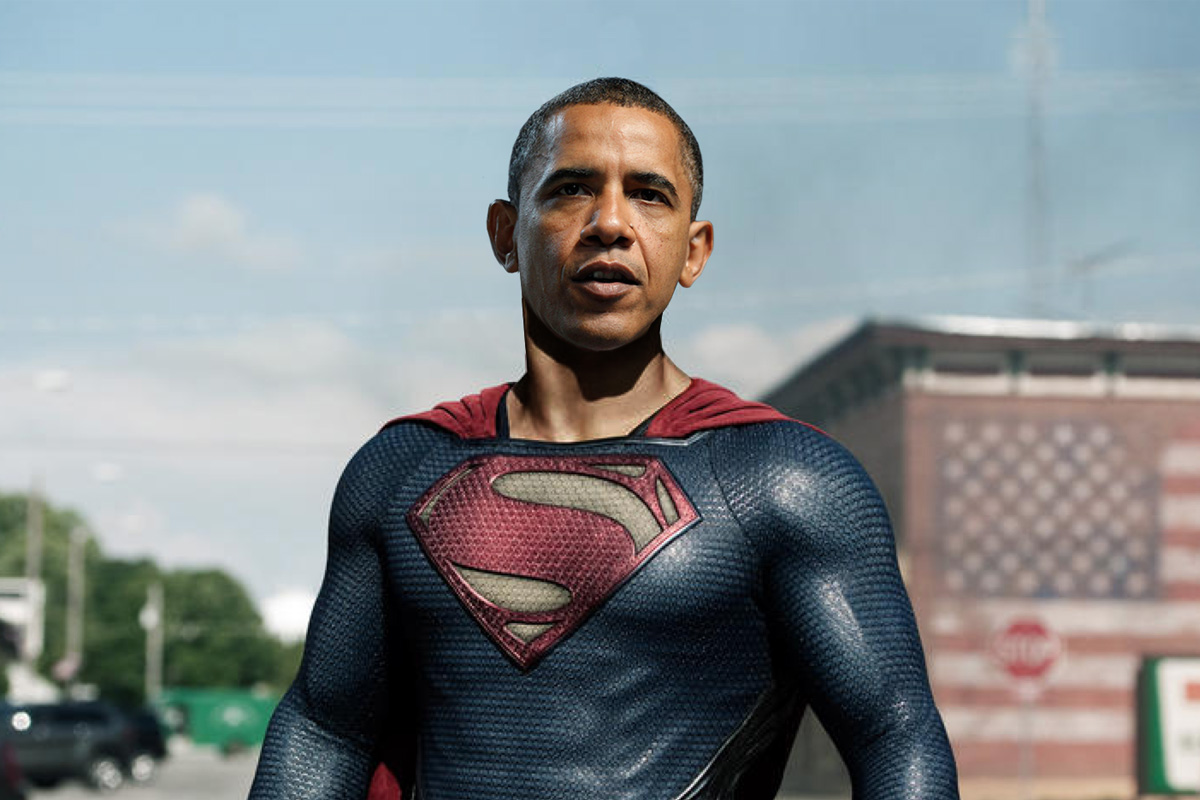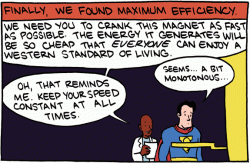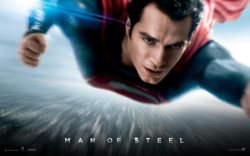 I finally got around to seeing Man of Steel last week and it’s got me thinking about the limits of individual action. Relatedly (ahem), Obama is going to deliver a “major climate speech” on Tuesday.
I finally got around to seeing Man of Steel last week and it’s got me thinking about the limits of individual action. Relatedly (ahem), Obama is going to deliver a “major climate speech” on Tuesday.
The great conundrum of Superman is that he can do almost anything. Over the years, he’s gone from leaping tall buildings in a single bound to reversing time by flying around the earth really fast. His power has almost no limit; the only limit is his will. On one level, this just forces writers to create artificial weaknesses for him (see: kryptonite) or to bring in a constant stream of super-duper-villains (see: Darkseid).
But it also points to a deeper problem with the Superman character, one of the reasons it’s so difficult to make a good movie about him. Because Superman could be doing almost anything at any moment, he faces limitless opportunity costs. For every second he is Clark Kent, puttering away on a typewriter, he is opting, in effect, to let people die in order to finish a story. Every second he’s plucking a kitten out of a tree, or helping an old lady cross the street, or just peering off in the distance, people are dying whom he could have saved.
This moral conundrum applies to all of us on some level, of course. Right now you’re reading this blog post instead of, I don’t know, traveling to Haiti to help feed the displaced. But there’s only so much you could be doing, so your opportunity costs aren’t quite so large; your personal quality of life stacks up against them reasonably well.
But Superman’s quality of life is almost meaningless relative to the good he could be doing. Follow this logic far enough and you reach the conclusion that Superman should effectively turn all his power over to human service. Matt Yglesias puts it this way:
What we’re talking about, essentially, is the world’s greatest solar power cell. The earth’s yellow sun gives his eyes the ability to boil water, and his arms and legs can exert enormous amounts of force. In other words, he could be rigging up a plan to generate enormous quantities of pollution-free electricity! … The world needs cheaper energy and the world needs cleaner energy, and Superman could be delivering it.
Back in 2011, Saturday Morning Breakfast Cereal comics made the point in a more extended way, via the comic to the right (click for the full comic, it’s brilliant).
Anyway, point is, we judge people in part based on what we believe them capable of. The hitch is, for both evolutionary and cultural reasons those beliefs tend to be inflated. We are ineluctably drawn to narratives with singular heros limited only by their resolve. Hell, it’s half the movie industry. We interpret events through the lens of individual striving. We overestimate the role of individual initiative, and underestimate systemic forces and contingency, in outcomes of all scales. How else could anyone fool themselves into believing they live in a meritocracy?
Amusingly, psychological research has shown that when we fail, we tend to ascribe it to impersonal forces, fate and circumstance. But when others fail, we ascribe it to a lack of effort and initiative. It’s called actor-observer asymmetry. We will, all things being equal, tend to judge others too harshly because we overestimate their power over outcomes.
This has all been on my mind as Obama’s “major climate speech” approaches. Inevitably, it’s being framed in the language of heroic melodrama. On the left: Has Obama “woken up”? Is he finally going to “get serious” and “do something”? In the “center”: Is Obama endangering Gina McCarthy’s nomination to head EPA? Will this hurt the immigration effort? On the right: Is tyrant Obama jamming more job-killing taxes through something something … ?
All of this has the familiar effect of casting U.S. politics as a narrative in which Obama is the protagonist, limited only by his will. (“Do not make me unleash the power of this fully operational Bully Pulpit!”) I’ve complained about the cult of the presidency before, perhaps to the point of becoming tedious, but events like this upcoming speech really bring it out. How one judges the plan Obama introduces tomorrow will depend in large part on how one assesses his power to affect outcomes. If you think he can turn the ship of state with the power of his rhetoric, well, you’re in for a disappointing film.
Obama isn’t Superman. The story of this speech is the story of an American executive-branch leader struggling for traction in the face of hostility from the other two branches of the federal government, dozens of other pressing priorities (including the rollout of Obamacare), and a public that is mostly consumed by more immediate problems.
Any time one cites the structural impediments facing Obama, one is accused of being a lickspittle Obama apologist. But that misses the point, which is not to take a stand in the unending “Obama: Hero or Failure?” debate, but to pull our attention back a little so we can see that the time and energy spent on that debate are grossly disproportionate to the actual role Obama plays in the larger climate story.
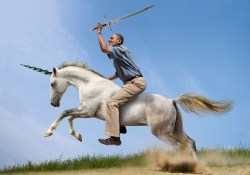
Shutterstock / White House
It is perfectly possible to take this perspective and still believe that Obama’s decisions are significant, that there’s more he could do, and that activists ought to pressure him. All that is true. But it doesn’t change the fact that his range of motion is tightly circumscribed in ways he has little power to change. Congress won’t pass any new laws on climate or clean energy, so all Obama can do is instruct federal agencies to interpret existing laws in ways that reduce carbon. And those new regulations are subject to review from a hostile court, so they must be cautious, all i’s dotted and t’s crossed.
I’ll get into the details of the plan once it’s out. And yes, I’ll knock Obama for things he could have done but didn’t. But it would help if everyone, in the public and media alike, acknowledged that Obama — or any U.S. president without the support of Congress, the courts, or a broad and deep popular movement — is a bit player on the domestic-policy stage. He deserves to be held responsible and accountable for his actions, but there will be no prospect of broad, enduring success on climate until structural features of American politics change.
Structural impediments aren’t as fun to talk about, aren’t as viscerally engaging and instinctively comprehensible, don’t tap into the deep human love of heroic narrative. But they are the geological forces that shape the field on which Obama plays his role. The field is the problem.
“Waitin’ for a Superman,” The Flaming Lips:
